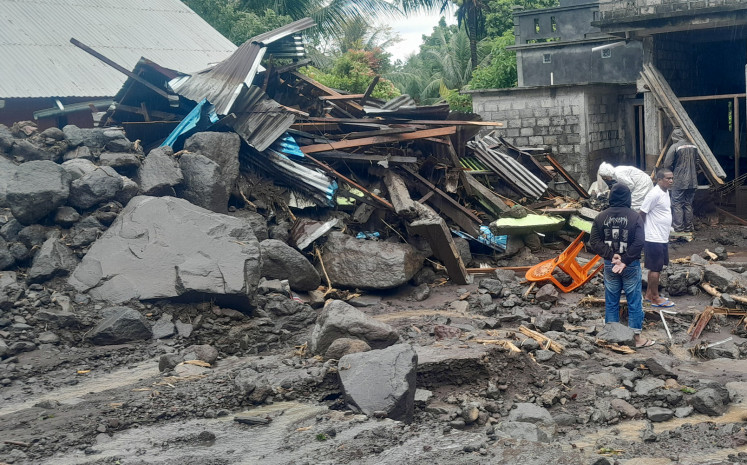Popular Reads
Top Results
Can't find what you're looking for?
View all search resultsPopular Reads
Top Results
Can't find what you're looking for?
View all search resultsIndonesia told to focus on renewable energy
The National Energy Council (DEN) has issued a series of recommendations to reorient the national energy policy to renewable energy by 2050, urging the government to stop exporting gas and coal to preserve depleting fossil energy reserves
Change text size
Gift Premium Articles
to Anyone
T
he National Energy Council (DEN) has issued a series of recommendations to reorient the national energy policy to renewable energy by 2050, urging the government to stop exporting gas and coal to preserve depleting fossil energy reserves.
DEN secretary-general Hadi Purnomo said that with the rise in fuel consumption and a decline in fossil energy reserves, renewable energy must be utilized and stop exports of gas and coal must be stopped as they could be used as alternatives to oil.
'Indonesia is facing energy problems both upstream and downstream, with no new energy alternatives to substitute fossil fuels and with a lack of effort being taken to maximize the usage and production of bioenergy. Worse still, the country views gas and coal as commodities to source foreign exchanges, while the majority of people in this country continue to believe that we are an oil-rich country,' Hadi told a seminar on Thursday.
The country's energy mix in 2050, according to the council's National Energy Policy Design, should comprise 30 percent renewable energy, 26 percent coal, 24 percent gas and 20 percent oil. In order to meet the target, in 2025 renewable energy use should account for at least 23 percent of total energy consumption. Also in the same year, oil should account for 25 percent, coal 30 percent and gas 22 percent.
Currently, the council's data shows that Indonesia still relies on oil to meet 44 percent of its energy needs, while gas accounts for 23 percent, coal 27 percent and renewable energy 6 percent.
It is estimated that reserves for oil, gas and coal will run out in 10 years, 30 years and 80 years, respectively.
While fossil energy is running out, Indonesia is expected to see a sixfold increase in both final and primary energy consumption to cope with economic and population growth. Final energy is estimated to reach 640 tons of oil equivalence (TOE) in 2050 compared to 102 TOE in 2010, while primary energy consumption is projected to rise to 980 TOE from 159 TOE.
In order to reach the target, Hadi said the country had to treat fossil energy as precious capital for development rather than a money-spinning commodity.
Last year, for instance, Indonesia exported 3,692 million standard cubic feet per day (mmscfd) of gas, nearly 50 percent of a total production level of 7,307 mmscfd.
Qoyum Tjandranegara, a committee member of downstream oil and gas regulator BPHMigas, supported Hadi's statement, saying that the country was suffering substantial losses by exporting gas for Rp 4,500 (45 US cents) per liter while at the same time subsidizing fuel that cost Rp 9,000 per liter.
National Economic Committee (KEN) economist Aviliani said that to achieve the target, the country had to scrap its fuel subsidy and adjust the price to the global market to curb fuel consumption and to disburse more incentives to develop renewable energy.
'If the government keeps on subsidizing fuel to deflate the price, it will be hard for us to build up renewable energy. If we adjust the price to that of the market, even the private sector will be interested in developing renewable energy as an alternative to fossil fuels,' she said.










